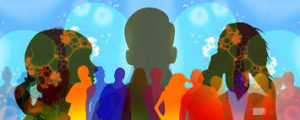The Table of Nations
10: 1-32
REFLECT: If someone were to write a brief, biblical account of your life, following the pattern of this chapter, how would it read? Fill in the blanks. “I was born in _________, to the parents who ___________________________________. The big accomplishment in my life is _______________________, as typified in my life’s motto, _________________________________.”

This chapter reflects the results of the Tower of Babel. So the events of Chapter 11 actually occurred before Chapter 10. Because the prideful people there were attempting to be like God (3:5), they were scattered throughout the world. As a result, the nations were born. But before God leaves those nations to themselves and begins to deal with Israel, His chosen people from Abraham forward, He takes a loving look at all the nations of the earth, as if to say, “I am going to leave you for a while, but I love you. I have created you, I have ordered your future, and a way of salvation will be provided for you.”179
As Chapter 10 begins, Noah has died, but his sons are very much alive. The LORD had told Noah’s sons, “Be fruitful and increase in number and fill the earth” (9:1). They were obedient, and in the years that followed, the world was populated. ADONAI tells how the nations were born and how they were scattered, at first in the ancient Near East, but eventually, over all the earth. The nations of the then-known world are divided into three broad categories corresponding to the three sons of Noah.
Shem, as one of Noah’s sons most interested in God’s promise of the Seed of the Woman (3:15), would be the logical one to keep such a record. He lived for about 500 years after the Flood (11:10-11), which would have encompassed the entire period included in the birth of nations. It is significant that the sons of Ham and Japheth are given only to the third generation after the Flood, but Shem’s descendants extend to the sixth generation, indicating that he probably lost touch with the other branches of the family after the confusion of languages at the Tower of Babel. His signature is attached in the subscript after he had written the account at Babel in 11:10.180
Striking by their omission from the TaNaKh are references to a number of major ethnic or even racial groups. Most remarkable is the lack of any allusion to East Asians such as Chinese, Japanese, and Koreans. Also missing are peoples such as Native Americans, Polynesians, Australian aboriginals, and others. Even such prominent shapers of ancient civilization as the Sumerians are bypassed in the Biblical record. The reason in each case is the fact that the Bible is a theological history oriented to a chosen people, and not a handbook describing ancient racial and ethnic distribution on a global scale.181
This chapter shows that all nations are of one blood. When we read the origin of all nations, we notice the difference between biblical and secular history. Too often the world emphasizes racial or cultural differences, but the Bible completely contradicts that notion with the knowledge that everyone is related to one another through Noah, or one of his sons Shem, Ham or Japheth. That is why Yeshua would say: Go and make disciples of all nations (Matthew 28:19). The emphasis on our racial and cultural differences undermines this unity and runs counter to the LORD’s will for us. He basks in our rich cultural diversity and variety, which He has created. We need to learn to do the same.182
This chapter shows that the nations are infected with a sin nature, the common disease of all mankind. There is no difference for all have sinned and fall short of the glory of God (Romans 3:22). But God demonstrates His own love for us in this: While we were still sinners, Christ died for us (Romans 5:8).
This chapter shows that all nations have one way to salvation. The Bible teaches that ADONAI would work through Shem and the Jewish nation. He said to Abram: I will make you into a great nation and I will bless you (12:2a). But Elohim told Abram that salvation included the descendants of Ham and Japheth as well: All peoples on earth will be blessed through you (12:3b). The Seed of the woman (3:15), Jesus Christ, would come through Shem. He says to us today: I AM the way and the truth and the life. No one comes to the Father except through Me (John 14:6).
How then must we, as believers, view the issue of the LORD and the different races of mankind? The answer lies in the unifying message of the gospel of Yeshua Messiah. The counterpart to the judgment that dispersed mankind at Babel, resulting in language and race distinction, is the healing of the feast of Weeks in which language confusion was overcome and peoples from every nation under heaven (Acts 2:5) were joined in common faith and fellowship. They returned to their homes still speaking their native tongues, observing their ethnic social customs, and bearing the genetic characteristics with which they had come to Yerushalayim. But they also went away realizing, as Rabbi Sha’ul would say later: There is neither Jew nor Greek, slave nor free, male nor female, for you are all one in Christ Jesus (see the commentary on Galatians, to see link click Bn – There is Neither Jew nor Gentile in the Body of Messiah).183



Leave A Comment